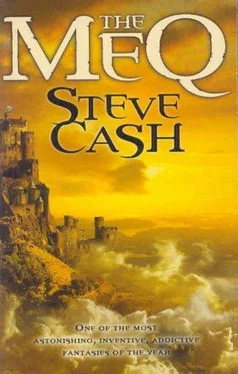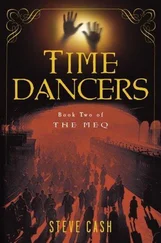Steve Cash - The Meq
Здесь есть возможность читать онлайн «Steve Cash - The Meq» весь текст электронной книги совершенно бесплатно (целиком полную версию без сокращений). В некоторых случаях можно слушать аудио, скачать через торрент в формате fb2 и присутствует краткое содержание. Год выпуска: 2005, Издательство: Del Rey, Жанр: Фэнтези, Детективная фантастика, ya, на английском языке. Описание произведения, (предисловие) а так же отзывы посетителей доступны на портале библиотеки ЛибКат.
- Название:The Meq
- Автор:
- Издательство:Del Rey
- Жанр:
- Год:2005
- ISBN:нет данных
- Рейтинг книги:4 / 5. Голосов: 1
-
Избранное:Добавить в избранное
- Отзывы:
-
Ваша оценка:
- 80
- 1
- 2
- 3
- 4
- 5
The Meq: краткое содержание, описание и аннотация
Предлагаем к чтению аннотацию, описание, краткое содержание или предисловие (зависит от того, что написал сам автор книги «The Meq»). Если вы не нашли необходимую информацию о книге — напишите в комментариях, мы постараемся отыскать её.
The Meq — читать онлайн бесплатно полную книгу (весь текст) целиком
Ниже представлен текст книги, разбитый по страницам. Система сохранения места последней прочитанной страницы, позволяет с удобством читать онлайн бесплатно книгу «The Meq», без необходимости каждый раз заново искать на чём Вы остановились. Поставьте закладку, и сможете в любой момент перейти на страницу, на которой закончили чтение.
Интервал:
Закладка:
Sailor looked to Geaxi and then to me, barely suppressing a grin. We knew the “Hare” had to be Opari.
We helped the man up and he gathered his sensibilities, then departed in a flurry to who knows where. On the spot, we discussed if our search for Zeru-Meq should continue or whether we should go to Peking and explore other avenues. Sailor said we should keep looking for Zeru-Meq. “Without him,” he said, “we will get nowhere in Peking. If Opari is behind an imperial gate, Zeru-Meq will know the gatekeeper.” Geaxi and I reluctantly agreed.
After that, we stepped up our search, traveling faster and resting less. We covered Honan province and Hupei to the south. We doubled back through Shensi and north as far as Ningsia. At every stop, whether riverfront opium den or mountaintop shrine, Sailor thought we had learned something, inched a bit closer, or didn’t have long to go. He had started asking certain questions in a certain way, so that he could read between the lines of the answer and anticipate Zeru-Meq’s movements. The longer we kept at it, the more obsessed he became.
For two more years we searched in vain. Then, in a remote Taoist monastery near Yushu, at the far west end of Szechwan, not far from Tibet, which was supposed to be our country of origin, we gave up.
It happened suddenly. After our arrival and a few inquiries, we were taken back to the kitchen and shown an ancient slab-oak table, twelve feet long and four feet wide. We were told it was used for everything from the preparation and serving of food to communal meetings and prayer. On the far end and carved into the edge was a poem. We were informed, after asking, that it had been written “the day before yesterday.” It read:
The oyster folds over the Pearl
The Hare stays put in the nest
Your steps are loud
Your thoughts are thunder
Why do you still hunt?
Sailor turned bright red and pounded his fist on the table. The monk who had shown us the carving jumped back and then excused himself, not knowing how to respond to such a violent reaction. Then, just as suddenly, Sailor broke into laughter, loud and long, more than I’d ever heard him laugh before. When he stopped, he said, “This game is over. I will not play any longer. Do either of you have anything else in mind? Anything will do. We must try something else.”
I suggested we go to Peking and cable Unai and Usoa. They might know something of Zeru-Meq through the movements of the Fleur-du-Mal. While we were waiting for their reply, we could try and find a hint of Opari. What could we lose except time?
Geaxi agreed and Sailor was open to anything. The next day we started on the long trip to Peking. It was spring of 1904 and we had been after Zeru-Meq for almost eight years.
We traveled by train as often as we could. Now that our priorities had changed, we were anxious to get to Peking. We were silent for hours on end. I think all three of us were disillusioned, but when we did speak, I noticed Sailor was much more pleasant. We watched the vastness of China pass around us, and in our Buddhist robes we probably looked more like the young monks we were supposed to be than we ever had.
When we were still a good distance from Peking, maybe two hundred miles, the train made an unscheduled stop close to Ta T’ung and near the ancient Yün Kang caves that contained thousands of Buddha statues, images, and carvings. We were there for at least twenty minutes and outside I heard men shouting and yelling while they loaded something heavy into a car farther down the train. People inside were grumbling about the delay, but once we got going, everyone settled back into the stupor of a long train ride.
I was dozing myself when I was suddenly jolted awake by a boy falling into me. He was carrying an armful of umbrellas and he fell across my lap and rolled into the seat next to me, forcing Geaxi to squeeze up against the window. He never once dropped the umbrellas, holding them with both arms in front of him like a bundle of trees. I couldn’t see his face, but he was apologizing profusely in Chinese. Sailor was sitting across from us, facing the boy. Then the boy began placing the umbrellas between his knees, lowering them one at a time. After two or three, Sailor could see his face.
“It is not so,” Sailor said. “Please, say it is not so.”
The boy lowered the rest of his umbrellas and I could see his face. He had curly black hair, green eyes, and he was definitely Meq.
Geaxi laughed out loud.
“Egibizirik bilatu,” the boy said with a smile. “Do the Meq not say that still?”
Geaxi, still laughing, said, “And five lights shine at the birth of every Buddha.”
The boy laughed along with Geaxi and said, “I am afraid I am out of salt,” then he looked directly at Sailor and said, “Hello, old one.”
Sailor stared back at him and without taking his eyes off the boy said, “Zianno Zezen, meet Zeru-Meq.”
The boy turned and focused his concentration on me. He looked me over thoroughly. “I did not know your father,” he said, “but I knew your grandfather. A tragedy.” Then he nodded toward Sailor. “Did this old wanderer tell you I was ‘unpredictable’?”
I looked at Sailor, who was shaking his head. “Actually, he said you were ‘completely unpredictable.’ ”
Zeru-Meq started laughing again and trying to find a place to put his umbrellas, as if we had all been planning to meet and he was just a little late.
Sailor said, “Why now? Why here? What’s the point?”
“The point is, old one,” Zeru-Meq said, finally putting up the last of his umbrellas, “that to find something while one is still looking is to lose it, but to find something after one has stopped looking, that is discovery. Anyway, it is I who need your help at the present. We can discuss your needs later. Do you still carry those wonderful Stones?”
Sailor, Geaxi, and I all glanced at one another, unsure of how much information we wanted to share. Sailor solved it, saying simply, “Yes.”
Zeru-Meq said “very well,” and went on to tell us that during the decay of the Ch’ing dynasty, open vandalism and looting were taking place at many sacred temples and shrines such as Yün Kang, which we had just passed. That was why the train had stopped, he said, to pick up stolen heads from several statues of Buddha to sell to foreign museums and art collectors. Zeru-Meq said this was an abomination to him. He told Sailor that just outside Peking, where the shrine robbers had planned their drop-off, he had planned his own pickup. Once they had unloaded their sacred contraband, if we could make the scoundrels “forget,” then his men would be there to return the heads to their rightful owners in Yün Kang. He also said that doing this would make Sailor “feel better.”
Geaxi stifled a giggle and we all agreed to help. Sailor was silent for most of the remaining journey, but I spoke to Zeru-Meq about many things and in the course of our conversation brought up the Fleur-du-Mal. I asked him what he was capable of and, straight out, if he had heard from or seen him recently.
He looked at me openly and smiled. He had the same brilliant white teeth as the Fleur-du-Mal, and his eyes were the same deep green, but there the similarities ended. I sensed no evil in Zeru-Meq.
“The Fleur-du-Mal,” he said, “is a righteous man. He does only one thing based on one way of thinking — that which is forbidden. He is not a grand thief or even a good murderer. He is a common man, as clear as a mountain stream, only he does not think he appears this way because of his obsession with the forbidden. If starving were forbidden, he would never eat another egg. The Fleur-du-Mal, Xanti Otso, is a pilgrim. A sad, dangerous pilgrim.”
Читать дальшеИнтервал:
Закладка:
Похожие книги на «The Meq»
Представляем Вашему вниманию похожие книги на «The Meq» списком для выбора. Мы отобрали схожую по названию и смыслу литературу в надежде предоставить читателям больше вариантов отыскать новые, интересные, ещё непрочитанные произведения.
Обсуждение, отзывы о книге «The Meq» и просто собственные мнения читателей. Оставьте ваши комментарии, напишите, что Вы думаете о произведении, его смысле или главных героях. Укажите что конкретно понравилось, а что нет, и почему Вы так считаете.












